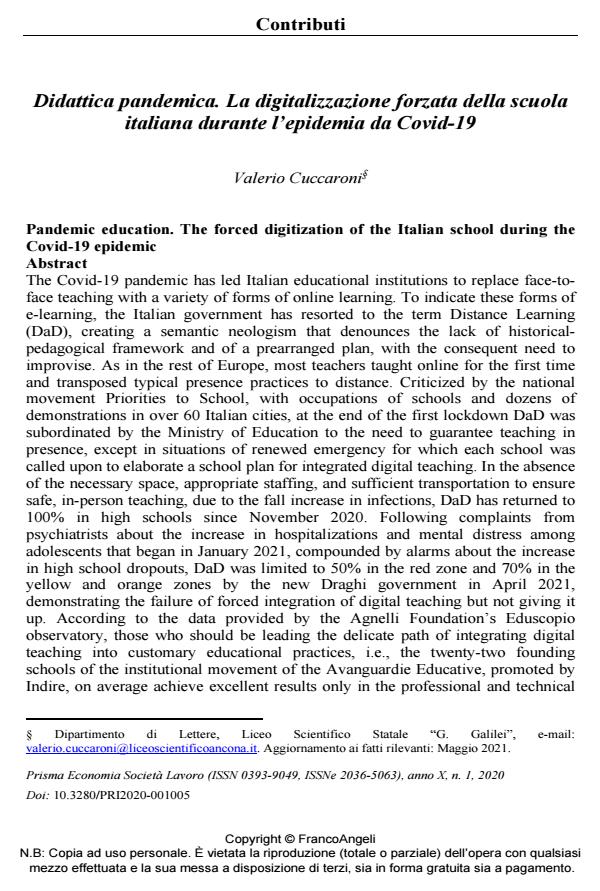Pandemic education. The forced digitization of the Italian school during the Covid-19 epidemic
Journal title PRISMA Economia - Società - Lavoro
Author/s Valerio Cuccaroni
Publishing Year 2021 Issue 2020/1
Language Italian Pages 18 P. 59-76 File size 281 KB
DOI 10.3280/PRI2020-001005
DOI is like a bar code for intellectual property: to have more infomation
click here
Below, you can see the article first page
If you want to buy this article in PDF format, you can do it, following the instructions to buy download credits

FrancoAngeli is member of Publishers International Linking Association, Inc (PILA), a not-for-profit association which run the CrossRef service enabling links to and from online scholarly content.
The Covid-19 pandemic has led Italian educational institutions to replace face-to-face teaching with a variety of forms of online learning. To indicate these forms of e-learning, the Italian government has resorted to the term Distance Learning (DaD), creating a semantic neologism that denounces the lack of historical-pedagogical framework and of a prearranged plan, with the consequent need to improvise. As in the rest of Europe, most teachers taught online for the first time and transposed typical presence practices to distance. Criticized by the national movement Priorities to School, with occupations of schools and dozens of demonstrations in over 60 Italian cities, at the end of the first lockdown DaD was subordinated by the Ministry of Education to the need to guarantee teaching in presence, except in situations of renewed emergency for which each school was called upon to elaborate a school plan for integrated digital teaching. In the absence of the necessary space, appropriate staffing, and sufficient transportation to ensure safe, in-person teaching, due to the fall increase in infections, DaD has returned to 100% in high schools since November 2020. Following complaints from psychiatrists about the increase in hospitalizations and mental distress among adolescents that began in January 2021, compounded by alarms about the increase in high school dropouts, DaD was limited to 50% in the red zone and 70% in the yellow and orange zones by the new Draghi government in April 2021, demonstrating the failure of forced integration of digital teaching but not giving it up. According to the data provided by the Agnelli Foundation’s Eduscopio observatory, those who should be leading the delicate path of integrating digital teaching into customary educational practices, i.e., the twenty-two founding schools of the institutional movement of the Avanguardie Educative, promoted by Indire, on average achieve excellent results only in the professional and technical fields, while out of 27 courses of study that prepare students for university, only 13 appear among the top places in the ranking that measures the results of graduates from high school and the first year of university. In the face of these poor results, it is necessary to question the close link between INDIRE and private companies such as the multinationals of information technology and C2Group, a company of reference in Italy in the sector, which provides schools with integrated digital environments and is a sponsor of the Didacta fair, included by MIUR among the events included in the multi-year plan for teacher training.
Keywords: Education, E-learning, Freesoftware, Italian Ministry of Public Education, Educational Avant-garde.
Valerio Cuccaroni, Didattica pandemica. La digitalizzazione forzata della scuola italiana durante l’epidemia da Covid-19 in "PRISMA Economia - Società - Lavoro" 1/2020, pp 59-76, DOI: 10.3280/PRI2020-001005